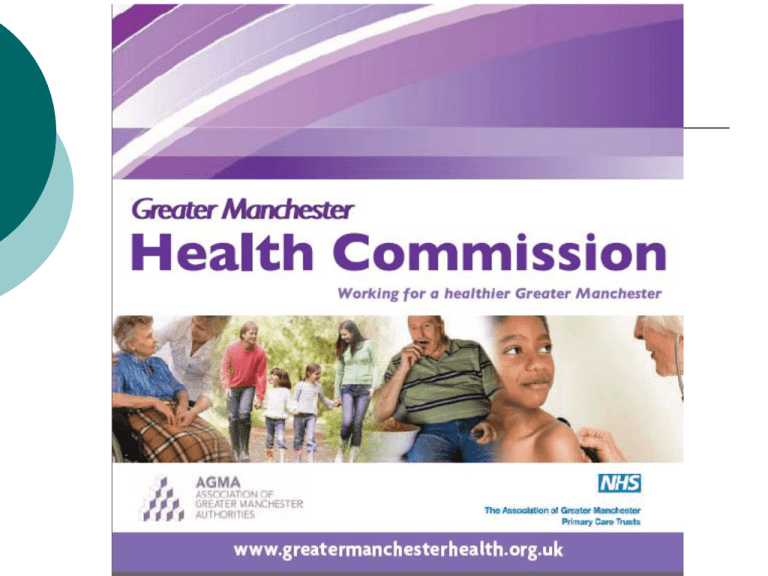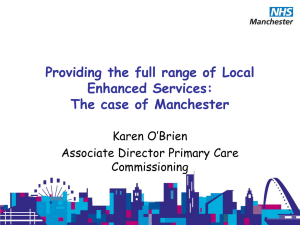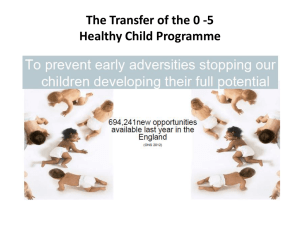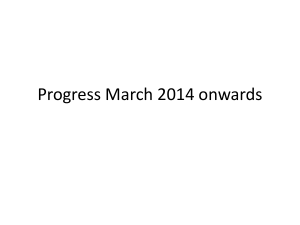GM Health Commission
advertisement

Andrew Burridge Policy & Programme Manager AGMA Policy & Research Team based in Wigan Investment Centre AGMA Executive GM Health Commission Planning and Housing Improvement And Efficiency Environment Commission for the New Economy Transport for GM Public Protection Why Greater Manchester? Manchester Independent Economic Review (April 2009) http://www.manchester-review.org.uk/ Manchester is… a single functional economy. Manchester “punching below its weight”? Agglomeration economics suggesting a need for a critical mass of skills, jobs, industries. increased density of well-connected people and firms is highly correlated with strong economic performance and perhaps most significantly, improved environmental outcomes A need for more coherent spatial development across a GM footprint (housing, transport) The Greater Manchester Strategy History of collaborative working across GM City Region Pilot status Combined Authority and Local Enterprise Partnership The Greater Manchester Strategy The GMS acts as the overarching framework for working at the GM level. Ten strategic priorities, underpinned by a series of objectives and GM pilots. Following on from Total Place programme, spatial pilots for Early Years, Better Life Chances, Housing and Low Carbon. Delivery structure under the AGMA Executive, including WLT, BMG and SMG. The View from the Moon Strategic priorities Early years Better life chances The highly skilled Attracting talent Transport Economic base International connectivity Low carbon economy Housing market Sense of place What is the GM Health Commission? Greater Manchester suffers from some of the worst health in the country. To counter this the Greater Manchester Health Commission was set up in 2007 to improve the health of the two and a half million people living in Greater Manchester. The Commission is the formal partnership made up of leading representatives from Greater Manchester’s Councils, NHS Primary Care Trusts, and the Higher Education Sector, who are working together to put right and tackle health inequalities in the city region. Our vision is of a Greater Manchester with improved life expectancy, health and well-being, with a clear reduction in health inequalities experienced by different parts of the city region. Why do we need a GM Health Commission? Greater Manchester is a thriving area, rich in tradition and culture. However, the city region also suffers from some of the worst life expectancy and health problems in the UK. Health inequalities show that on average a child born today in Greater Manchester is unlikely to live as long as a child born almost anywhere else in England. There are big inequalities between different areas across Greater Manchester, for instance, with alcohol responsible for almost twice as many months of life lost for men in some areas than in others. Examples of previous work …a focus on public health leadership advised by GM Directors of Public Health Smoking Manifesto Influencing local organisations to adopt tackling fuel poverty as one of their key objectives Influencing the priorities for the city region for the next 20 years via the Greater Manchester Strategy. Raising awareness of issues like obesity and domestic violence Minimum Unit Price for Alcohol A major area of work for the Health Commission How did it come about? What has the Commission achieved? Equity & Excellence: Liberating the NHS – Health White Paper Published 12 July 2010, Government response to the consultation expected before Xmas Move to GP consortia commissioning and abolition of PCTs in 2013 Creation of a National Commissioning Board Freeing existing providers with all becoming Foundation Trusts Consultation on a new outcomes framework A new public health white paper with a new health improvement role for local authorities, and the creation of Health & Wellbeing Boards Healthy Lives, Healthy People - Public Health White Paper Due for publication November 30th 2010 Creation of a new national Public Health Service. It will be responsible for vaccination and screening programmes and have powers relating to public health emergencies. PCT responsibilities for health improvement will transfer to local authorities, who will employ the Director of Public Health jointly appointed with the Public Health Service. Ring-fenced public health budget, allocated to reflect relative population health outcomes, with a new health premium to promote action to reduce health inequalities. Public Health will need to influence GP consortia commissioning through Health & Wellbeing Boards. Commission priorities for 2011 NHS Reform in GM Minimum unit price for alcohol and wider GM Alcohol Strategy Cycling/Active Travel Healthy Food campaign, incorporating work on transfats NHS Reform in GM Supporting the establishment of the new commissioning architecture Operating Framework for the NHS in December 2010 GP consortia pathfinders Creation of a shadow NHS Commissioning Board Plans for PCT clustering NHS Reform in GM Embedding leadership for health improvement H&WB Board Early Implementer status GM Health Commission and a future GM H&WB Board Northwest Transitional Support NHS Reform in GM Securing engagement in NHS delivery Community Budgets Spatial pilots Welfare Work Programme Detailing the case for a focus at the GM level What role would a GM Health & Wellbeing Board take? Roles? To provide oversight to NHS commissioning activities which extend across consortia should they be retained To provide oversight of service reconfigurations To provide a mechanism for the combined authority to influence the 25% of total public sector spend that is health in the GM City Region To ensure the maximum possible social value is levered out of this health spend in pursuit of GM Strategy Priorities To provide a focal point for maximizing the health and wellbeing impact of any potential GM wide community budgets (currently under discussion with the Treasury) To support GP consortia in recognizing where there are conurbation wide inter-dependencies of healthcare provision (e.g. as exemplified by work undertaken on stroke service reconfiguration across Greater Manchester) To maintain the focus currently provided by the GM Health Commission on total public sector commitment to population health interventions. To ensure the work of the Public Health England is deployed as effectively as possible in meeting GMS priorities and to ensure the most effective deployment of resource for GM level Public Health To ensure that the resilience and emergency planning functions of the national public health service are appropriately landed with the GM emergency planning functions. Other priorities for 2011 Minimum unit price for alcohol and wider GM Alcohol Strategy Cycling/active travel Healthy food campaign Any questions? Contact details Andrew Burridge – Policy and Programme Manager, GM Health Commission a.burridge@agma.gov.uk 07903071562








